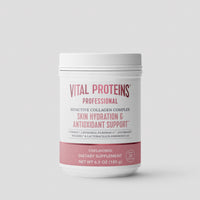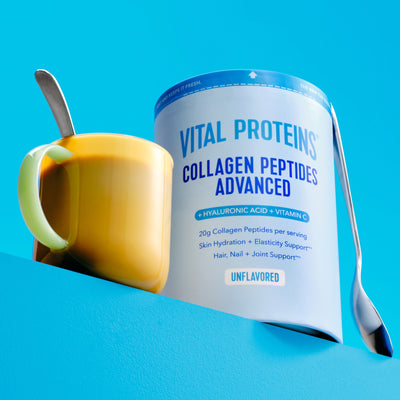If you've dreamed of asking a dermatologist all your aging skin questions, but haven't had the opportunity, consider your wish granted. Lively chatted with two dermatologists and asked them all the questions you've been Googling, including ones you're probably too embarrassed to ask (like, how can I look 10 years younger?). Keep reading for all the things you need to know about aging skin, including signs, causes and tips for stopping aging signs in their tracks.
What does aging skin look like?
NYC-based dermatologist, Dr. Hadley King, notes that signs of aging skin can include subtle changes in the skin's laxity and texture or the appearance of fine lines and discolorations. Overall, as we get older, our skin gets thinner and less resilient.

What causes skin aging?
There are two leading causes of skin aging: intrinsic and extrinsic aging. "Intrinsic aging is our skin's genetically programmed aging, while extrinsic aging refers to environmental exposures that speed up that aging process," says NYC-based dermatologist, Dr. Joshua Zeichner.
In terms of the overall loss of collagen in the skin, Dr. King says that it is due to two factors: increased breakdown of collagen and the inhibition of collagen production, which are both stimulated by UV exposure. "Sun exposure is a huge factor in decreasing collagen," Dr. King says. “Matrix metalloproteinases are proteolytic enzymes that break down collagen. UV radiation increases their activity, thereby increasing collagen degradation. UV radiation exposure also directly inhibits the production of collagen. Skin that has significant photodamage may undergo a 56% reduction in type I collagen as compared with skin that has been protected from the sun."
At what age does your face change most?
When it comes to aging skin, the sooner you start to up your anti-aging rituals, the better. "Skin cell turnover starts to slow down after the age of 30," Dr. Zeichner says. "I like my patients to think about a good skincare routine before that happens. Good skincare in your 20s ensures you have the best foundation possible for your skin to age from."
As for when you'll notice the most dramatic change in your skin, Dr. King says for women, it's usually around the beginning of menopause. "For women, there is a 30% drop in collagen during the first five years of menopause, according to a study, and this is likely why women start noticing fine lines and wrinkles as they approach or enter menopause," she says.
How can I stop my skin from aging?
Aging skin is inevitable, so you can't necessarily stop your skin from aging altogether. However, there are many effective ways to help minimize aging signs. Below, Dr. King shares her top lifestyle and skincare tips for aging skin.
Hydrate your skin
Your skin needs to stay hydrated to look its best. Dr. King recommends using humectants and emollients to keep the skin hydrated, moisturized and looking plump.
Exercise regularly
Here's some motivation to lace up your workout shoes.Studies have shown that exercise can do wonders for your skin. Not only will moving your body keep your skin looking youthful, but it may also reverse skin aging in folks who start working out later in life. In other words, it's never too late to reap the skin-enhancing benefits of exercise.
Minimize stress
Stress can wreak havoc on the skin and contribute to the development of wrinkles. The reason, Dr. King explains, is because cortisol (aka the stress hormone) breaks down the skin's collagen. So, the more stressed you feel, the more cortisol is produced, and your skin's ability to rebuild collagen and elastin declines. So, implementing stress-reducing habits into your lifestyle, such as exercise and meditation, will also help improve your skin's appearance.

Wear sunscreen
You've probably heard the importance of wearing sunscreen daily your entire life, but it's so important that it's worth repeating. "Much of the sun damage that accumulates in our skin is the result of daily incidental sun exposure," Dr. King says. So even if you're not planning to spend all day out in the sun, slather on the sunscreen.
Use antioxidants
Dr. King also advises incorporating topical antioxidants into your routine, such as vitamin C, which help protect the skin from free radical damage from UV rays and pollution. "Topical antioxidants combined with sunscreen have been shown to provide more sun protection compared to sunscreen alone," she says.
Take collagen supplements
Another way to help your skin stay youthful is by taking collagen supplements. Dr. King references a 2019 review of randomized controlled trials showing that oral collagen supplementation shows promising preliminary results in improving skin elasticity, hydration, and dermal collagen density.**
Try retinoids
If you're not already incorporating topical retinoids into your skincare routine, get on it, stat. Topical retinoids are powerful for anti-aging and are proven to change the skin significantly. "They increase the turnover of skin cells, reduce the tendency of cells and keratin debris to clump together and clog up pores, increase collagen production and decrease discoloration," Dr. King says.
Is skin aging reversible?
The short answer is not entirely, but to some extent, aging skin can be reversible. Dr. King notes that exercise, anti-aging topicals such as retinoids, antioxidants, anti-aging peptides and alpha-hydroxy acids, can not only keep the skin looking youthful but also help reverse existing aging skin signs.
How can I look 10 years younger?
To reverse the signs of aging skin, the best protocol is following all the above suggestions. But if you're only going to implement one ritual, let it be sun protection. "Sunscreen is by far the best and easiest way to prevent skin aging," Dr. Zeichner says. "Not only does it prevent UV light exposure from causing free radical damage, but studies have also shown that over the course of a year, sunscreen alone was associated with improvement in all signs of skin aging. This is likely because the sunscreen allows the skin to heal itself without the stress of UV light exposure and inflammation."
You heard it from the pros, people. Wear your sunscreen.
















